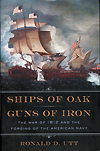
Ships of Oak, Guns of Iron: The War of 1812 and the Forging of the American Navy, by Ronald D. Utt, Regnery History, 2012, $29.95.
Ronald Utt’s very readable narrative of the War of 1812 focuses primarily on American naval actions. Featuring excellent illustrations, maps, tactical diagrams, a glossary of key people and a timeline of events, Utt offers the novice an enjoyable literary experience. For Utt the War of 1812 is the story of heroes cheering bravely amid thundering broadsides and rattling musketry at sea. Ashore, men and women of equal moral stamina tread the American wilderness, tongue-lash the enemy readying to torch their homes or huddle beneath the chipped ramparts of fortifications. You’ll also find antiheroes: Panicked officers surrender their commands, Indians flee their lands even as they scalp the pale-skinned invaders, and war-hardened officers watch impassively as their men loot and burn.
Correctly, Utt centers his narrative on the men of the neophyte U.S. Navy, whose victories sustained the war effort for the nation. From the Great Lakes to the English Channel to the Pacific Islands, successful single-ship and squadron actions counterbalanced, to some degree, the overall weak performance of American soldiery ashore. Even in defeat afloat, heroic resistance served to fill newspaper columns and kindle hope in the populace. Utt successfully captures both the elation and the agony of the actions that shaped a tradition of victory for the Navy.
Unfortunately, the volume offers scant new information or interpretation to those readers familiar with the war. A glance at Utt’s 10-page bibliography reveals a dearth of archival research. Rather, he has synthesized the work of historians (Donald Hickey, Theodore Roosevelt, John R. Elting, Brian Lavery and Spencer Tucker, among many other fine scholars) supported by published document collections. When compared to such recent publications as George C. Daughan’s 1812: The Navy’s War or Kevin D. McCranie’s Utmost Gallantry: The U.S. and Royal Navies at Sea in the War of 1812, there is a difference in scholarship and interpretation. Still, Utt’s foray into the period remains an excellent primer.
—Wade Dudley




